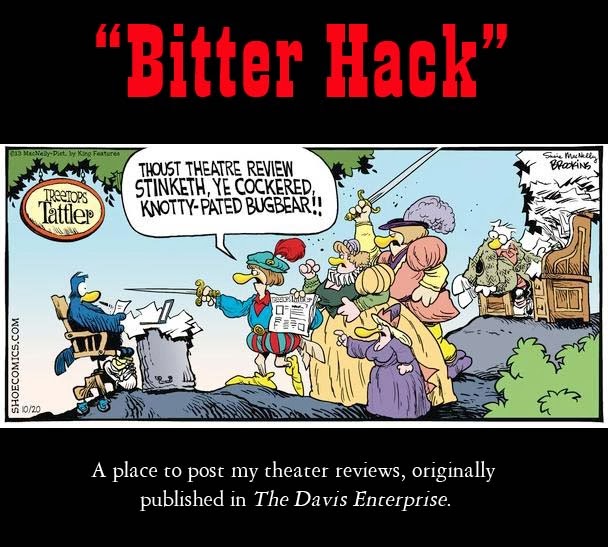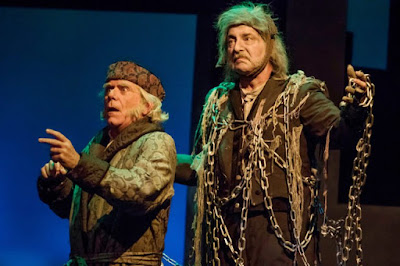 |
| Stage manager Kimmie McCann, takes a peek onto the stage as actors wait
backstage for her instructions during Davis Musical Theatre Company's
production of "Jekyll & Hyde."
Sue Cockrell/Enterprise photo |
|
|
When an audience sits down for a local musical-theater show, they see
a polished production — told by actors through words, song and dance —
that allows them to escape into another time and place.
But what they may not realize is how much coordination and activity
goes on during a night’s show behind the scenes: rapid costume and set
changes, the orchestra playing on cue, lighting and sound technicians
working with precision, actors doing last-second rehearsals in the
wings, makeup touch-ups and mic adjustments.
The Enterprise spent a day at Davis Musical Theatre Company during
its current production of “Jekyll and Hyde” to give audiences an inside
glimpse into everything that happens before and during showtime that
they
don’t see.
Here is how a Sunday-afternoon performance unfolded:
The actors are called to the theater at 12:30 p.m., so I showed up at
noon and found Conrad, from a professional cleaning service in Oakland,
scrubbing the lobby and taking bags of trash out. The lobby smelled
very clean.
Dannette Vassar, who would later appear on stage as Lady
Beaconsfield, was in the ticket booth making final adjustments on
ticketing for the day’s show.
I moved inside the theater itself and stage manager Kimmie McCann was
smoothing out some problems with set placement the previous night.
McCann, I would learn throughout the afternoon, is the real anchor for
the show and seems to be everywhere at once, fixing problems along the
way.
She conferred with costumer Jean Henderson about repairs she had made to a couple of costumes while Henderson was out of town.
“They aren’t your quality, of course,” she said. “It’s fun and games always,” she said to me as she went backstage.
Lights came on in the light booth and there was Vassar again. She’s
also on the light crew and presumably was making last-minute adjustments
there as well.
They sat me at a chair out of the way and it was fun to observe my
surroundings — walls covered with writing from various people over the
past years in the Jean Henderson Performing Arts Center theater, each
wall with a big “DO NOT PAINT” sign on it.
One wall is covered, all the way to the ceiling, with various chairs,
which will hang there until they are needed. Shelving units are set
aside for things like baskets of varying sizes or bottles, while a
hanging shoe bag is used for smaller props.
Meanwhile, the actors started arriving backstage, and began getting
out of their T-shirts and jeans and into costumes. The air-conditioning
had gone out in the dressing rooms, so they could not close the doors
and big fans blew air into the rooms.
“I’m not sure where we’re going to get the funds to fix it,” McCann said to me as she passed by.
To avoid crowding into the stuffy rooms, some of the actors were helping one another with costumes or makeup in the hallway.
Musicians started arriving at 1 p.m., including 88-year-old violinist
Helen Mendel, who has been playing with DMTC for many years. Mendel
chose not to climb all those stairs down into the orchestra pit, but
took the small elevator. All the orchestra members volunteer their time
and are “paid” a drink and a cookie at intermission.
The cast was called to the stage for the sound check. Some were doing
individual vocalizations and then they did vocals in unison.
At the same time, a group walked in and across the stage with a
leader, who was speaking to them softly. These were ushers for the show,
learning what their jobs would entail. (There are different volunteer
ushers for every performance — it’s a way to see the show for free.)
With the cast on stage, there also was a final check on lights and
then everyone was backstage again while director and DMTC co-founder Jan
Isaacson passed through each dressing room and gave final notes from
the night before.
McCann announced that the house was opening, so the backstage lights were turned off and the orchestra started to warm up.
“Places, please,” McCann called, while Isaacson went out on stage to welcome the audience.
The actors paced back and forth in the wings or did stretching
exercises while waiting to go on. I commented on Vassar’s costume and
she confessed that she had a quick change coming up, so she had dressed
in layers so she’d only need to remove her top layer when she came off
stage.
The first set pieces came off stage, with the actors, and the girls
of the ensemble quickly stripped McCann’s husband, Brian, of his bulky
clothes and got him into the costume for the next scene. With three of
them working, the change was accomplished in less than a minute.
Meanwhile, Kimmie McCann was everywhere — helping people straighten
their costumes, moving set pieces and making sure props were put away
immediately.
“I don’t say this just because she’s my wife,” Brian said, “but she’s
the most actor-friendly stage manager I’ve ever worked with.”
There’s even time for a quick tender moment between the couple before Brian goes on for his next scene.
DMTC co-founder Steve Isaacson came backstage to tell me of a sound
problem they had just solved. Tomás Eredia, working the light board,
noticed a problem with the sound board, so Steve relieved him of his
duties and the two worked to fix the sound.
In the meantime, Steve gave control of the light board to Jenna Karoly, a teen who has been learning how to run the system.
“She’s been with us since she was 8 years old,” Isaacson said, adding
that her father helps with sets and her mother sometimes bartends for
the theater.
He explained that there is a lot to running a sound board, especially
when it’s a new addition to a theater. (This is only DMTC’s third show
since sound augmentation was added.)
But it went off without a hitch.
“I was giving her cues,” Isaacson said. “She did the next scene
without my saying anything. I didn’t have to worry. The show continued
flawlessly.”
At intermission, I walked from one side of the theater to the other,
backstage, surprised to find a near life-size elephant on the other
side. This is a prop for the youth theater’s production of “Aladdin
Jr.,” which is being presented at Saturday matinees.
Jan Isaacson explained that after the Friday evening performance of
“Jekyll and Hyde,” those sets are pushed out of the way and “Aladdin”
sets are moved into place. Then following the “Aladdin” performance the
next afternoon, the parents of the young actors move those sets back in
place and the “Jekyll and Hyde” sets are ready for Sunday’s performance.
As Act 2 began, some of the actors sat on set pieces in the wings, taking cat naps while waiting for their turn to go on stage.
In the meantime, the show continued to run like a well-oiled machine under the constant movement of Kimmie McCann.
Actors assisted in set changes, donning black-hooded capes before going on stage.
“They make the actors mildly unobtrusive,” Steve Isaacson said,
explaining that there’s a light that reflects from the costumes onto the
floor and this is a way of cutting down on their visibility. One
actress nearly didn’t get to the stage in time to don her cloak — but
McCann was there to make sure she did.
At the end of the show, there was thunderous applause. The cast stayed on stage to greet the patrons.
Meanwhile, Kimmie McCann made certain that everything was put back where it should be, and ready for the next performance.






















